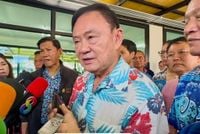On May 10, 2025, former Thai Prime Minister Thaksin Shinawatra faced a significant legal setback as the Court of Appeals upheld a lower court's decision denying his request to travel to Qatar. Thaksin, who is embroiled in legal proceedings concerning charges under Section 112 of the Thai Criminal Code, had sought permission to attend a dinner hosted by the Emir of Qatar, hoping to meet with former U.S. President Donald Trump.
According to former senator Somsak Asavangkarn, who shared the news on Facebook, the court's refusal was based on two main reasons: the lack of evidence indicating that Trump had invited Thaksin to the dinner and the proximity of an upcoming court hearing scheduled for June 13, 2025. "Bad news for Thaksin again. The Appeals Court upheld the lower court's decision not to allow him to fly abroad to meet Trump in Qatar. The reasons are: 1) there is no evidence that President Trump invited him, and 2) the Supreme Court is set to hear the case on June 13," he wrote.
The controversy surrounding Thaksin's legal troubles has been ongoing. He is currently facing charges related to lese majeste, a serious offense in Thailand that involves defaming the monarchy. This particular case has drawn significant public attention, especially given Thaksin's previous tenure as Prime Minister, which ended in 2006 when he was ousted in a military coup. His political career has been marked by a series of legal challenges and allegations of corruption.
On May 8, 2025, Thaksin had submitted a request to the court, seeking permission to travel to Qatar for the dinner. The invitation reportedly came from the office of the Emir, but the court determined that it was a personal invitation without a clear agenda that would warrant his travel. The ruling stated that the lack of a definitive schedule made it difficult to justify his absence from the ongoing legal proceedings.
In its ruling, the Criminal Court emphasized that Thaksin's request lacked sufficient grounds to grant him permission to leave the country. The court stated, "The defendant received an electronic letter from the administration of the Emir's palace in Qatar inviting him to a dinner in honor of President Donald J. Trump. This invitation was personal and did not extend to him in his capacity as an advisor to the Malaysian Prime Minister, who is the ASEAN chair for the year 2025. Furthermore, there were no details regarding a specific agenda, only a possibility that he might meet Trump and his economic team if the President attended the dinner."
Thaksin's legal team attempted to appeal the decision, submitting their request on May 9, 2025, a day after the initial ruling. However, the Appeals Court maintained the lower court's stance, further complicating Thaksin's situation as he navigates the legal landscape of Thailand.
In a broader context, the legal proceedings against Thaksin reflect ongoing political tensions in Thailand, where issues surrounding the monarchy and political dissent remain sensitive topics. The lese majeste laws are particularly controversial, with critics arguing that they are used to stifle political opposition and dissent.
On May 11, 2025, Jatuporn Prompan, a prominent political figure, commented on the situation, suggesting that Thaksin would not face imprisonment, regardless of the outcome of the lese majeste charges. Prompan asserted that the allegations against Thaksin were unlikely to lead to jail time, indicating a belief in the political maneuvering that often surrounds high-profile cases in Thailand.
As the June 13 court date approaches, the political implications of Thaksin's case are likely to intensify. Observers are closely watching how the legal proceedings will unfold and what impact they may have on Thailand's political landscape, especially given Thaksin's enduring influence and the divided opinions surrounding his legacy.
In summary, Thaksin Shinawatra's recent legal developments highlight the complexities of Thailand's political and judicial systems. The refusal to allow his travel to Qatar serves as a reminder of the challenges he faces as he attempts to navigate both his legal troubles and his aspirations for political rehabilitation.





